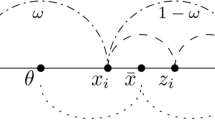Abstract
Weighted averaging is a method for aggregating the totality of information, both regimented and unregimented, possessed by an individual or group of individuals. The application of such a method may be warranted by a theorem of the calculus of probability, simple conditionalization, or Jeffrey's formula for probability kinematics, all of which average in terms of the prior probability of evidence statements. Weighted averaging may, however, be applied as a method of rational aggregation of the probabilities of diverse perspectives or persons in cases in which the weights cannot be articulated as the prior probabilities of statements of evidence. The method is justified by Wagner's Theorem exhibiting that any method satisfying the conditions of the Irrelevance of Alternatives and Zero Unanimity must, when applied to three or more alternatives, be weighted averaging.
Similar content being viewed by others
References
Carnap, Rudolf: 1962,The Logical Foundations of Probability, second edition, University of Chicago Press, Chicago.
DeGroot, Morris H.: 1974, ‘Reaching a Consensus’,Journal of the American Statistical Association 69, 118–212.
French, John R. P. Jr.: 1956, ‘A Formal Theory of Social Power’,Psychological Review 63, 181–194.
Harary, F. L.: 1959, ‘A Criterion for Unanimity in French's Theory of Social Power’, in D. Cartwright (ed.),Studies in Social Power, Institute for Social Research, Ann Arbor, Michigan, pp. 168–182.
Hintikka, Jaakko: 1966, ‘A Two-dimensional Continuum of Inductive Methods’, in Jaakko Hintikka and Patrick Suppes (eds.),Aspects of Inductive Logic, North-Holland, Amsterdam.
Jeffrey, Richard C.: 1965,The Logic of Decision McGraw-Hill, New York.
Lehrer, Keith: 1976, ‘When Rational Disagreement is Impossible’,Noûs 10, 327–332.
Lehrer, Keith: 1981, ‘The Evaluation of Method: A Hierarchy of Probabilities Among Probabilities’,Grazer Philosophische Studien 12/13, 131–141.
Lehrer, Keith, and Wagner, Carl: 1981,Rational Consensus in Science and Society Reidel, Dordrecht.
Ramsey, Frank P.: 1931, ‘Truth and Probability’, in Ramsey'sThe Foundation of Mathematics and Other Essays, R. B. Braithwaite (ed.), Routledge and Kegan Paul, London.
Reichenbach, Hans: 1949,The Theory of Probability, second edition University of California, Berkeley and Los Angeles.
Savage, Leonard J.: 1954,Foundations of Statistics John Wiley and Sons, New York.
Skyrms, Brian: 1980,Causal Necessity Yale University, New Haven.
Author information
Authors and Affiliations
Additional information
I am indebted to Carl Wagner for comments and discussion on this paper, but he is not, of course, responsible for any errors contained herein.
Rights and permissions
About this article
Cite this article
Lehrer, K. Rationality as weighted averaging. Synthese 57, 283–295 (1983). https://doi.org/10.1007/BF01064700
Issue Date:
DOI: https://doi.org/10.1007/BF01064700




